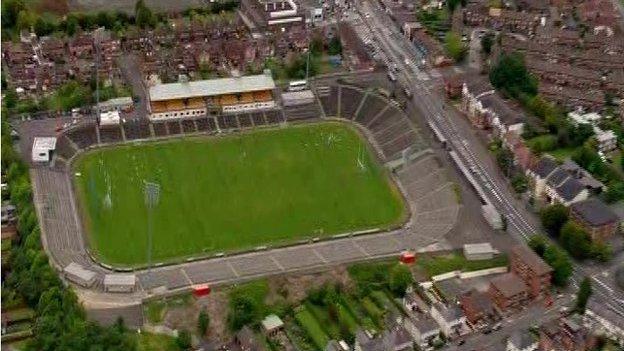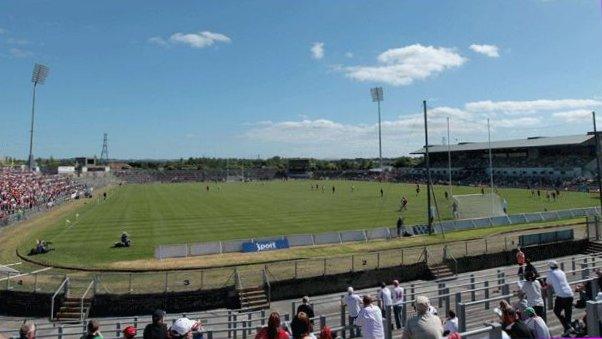Casement Park: Court told GAA stadium 'will not go to ruin'
- Published

The GAA wants to build a new 38,000-seat stadium on the existing Casement Park site but residents living close by are challenging the plan in the High Court
The Gaelic Athletic Association (GAA) will not abandon Casement Park, even if a decision to approve a new stadium on the site is quashed, a court has heard.
A group of residents who live near the west Belfast stadium are objecting to the planned £77m redevelopment and are challenging it in the High Court.
Government planners have expressed fears for the future of the aging stadium, should the GAA lose the case.
But the GAA confirmed its commitment to the site, denying it would go to ruin.
Counsel for the sporting organisation insisted that the west Belfast ground will remain a major part of its infrastructure, regardless of the outcome of the court challenge.
'Too big'
The residents have asked the High Court to overturn the granting of planning permission for a new 38,000-seat stadium on the existing Casement Park site.
They claim the proposed development will be simply too big for the area, blocking out light, and compounding traffic congestion.
Their lawyers have argued that the scale of the proposed development is not warranted by recent attendance records at Casement Park.
The Mooreland and Owenvarragh Residents Association (MORA) is seeking to judicially review Environment Minister Mark H Durkan's decision to give the green light to the redevelopment.
'Decaying stadium'
However, during Wednesday's hearing, warnings were issued over the potential consequences should the residents win their case.
Fans would be left with a crumbling and decaying stadium because government funding for the project would be spent elsewhere, a Planning Service lawyer predicted.
It was also claimed that 60 years of sporting and cultural heritage at the home of Gaelic games in Ulster could end up being lost if the building scheme is halted.
The judge asked the GAA's barrister for a response to the potential scenario being depicted on behalf of the Department of the Environment, which oversees the Planning Service.
The judge said: "They are making the case it will be left to wrack and ruin if this planning permission is not upheld."
However, the GAA's barrister said such a short-term view did not reflect the sporting organisation's thinking.
'Ireland's second city'
Citing affidavits from his client, he said: "The intention of the GAA is, and always has been, that Casement Park will form a major part of the GAA infrastructure in Northern Ireland."
The barrister added that the GAA regarded Belfast as Ireland's second city with a huge population zone.
He told the court that for more than 60 years, Casement Park has been "an integral part of the GAA's ambitions in Northern Ireland".
"The prospect that it would be abandoned and left to fall into disrepair so Belfast would be left without a GAA stadium is not realistic. It's not even theoretical," the barrister added.
More than £60m of the project's costs are being met by Northern Ireland's Department of Culture, Arts and Leisure, with the GAA paying £15m.
As part of their challenge MORA claims the stadium would be replacing a ground that has not come close to selling out a lower capacity in decades.
Central to the case is an allegation that an environmental assessment was defective because it relied on an existing 32,600 capacity as a baseline for examining the impact of an increase of just over 5,000 seats.
But the GAA's barrister argued that the ground has had larger crowds in the past.
"The GAA wants Casement Park and can demonstrate a need for Casement Park," he said.
The case continues.
- Published2 October 2014

- Published1 October 2014

- Published15 September 2014
